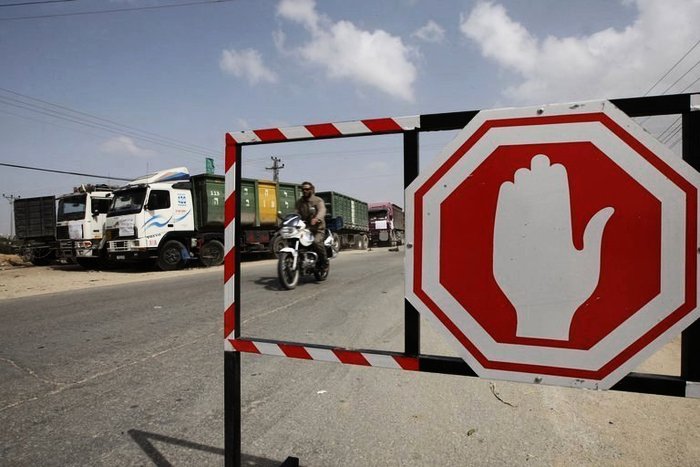
Ref: 54 /2015
The Palestinian Center for Human Rights (PCHR) published a new report as part of the series of the monthly “Closure Reports” addressing the latest developments of the state of the Gaza Strip border crossings in September 2015. The report documents the impact of the ongoing Israel-imposed siege on Palestinian civilians, which affects their economic and social conditions. It also refutes Israel’s claims that it has eased the closure of the Gaza Strip for the eighth consecutive year. Furthermore, the report highlights that the continuing Israeli measures aim to the institutionalization of the closure and making the illegal restrictions imposed on the movement of persons and goods acceptable on the international level although they violate the international law, including the international humanitarian and human rights laws.
According to the report, no remarkable change was witnessed on the movement of commodities. An almost complete ban continued on the exportation of commodities to the West bank, Israel and abroad, but exceptionally allowed the exportation of 128 truckloads to the West Bank; 113 truckloads of agricultural products, 5 truckloads of furniture, 4 truckloads of fish, 4 truckloads of clothes and 2 truckloads of mat straw . This represents 2.5% of the Gaza Strip exports before the total closure was imposed in June 2007.
Concerning the imports, more obstacles were created for the entry of basic commodities to the Gaza Strip, especially construction materials needed for Gaza reconstruction process and infrastructure projects. However, Israeli forces allowed the entry of 11,345 truckloads, the majority of which were consumables constituting an average of 377 truckloads daily. The number of allowed truckloads represent 66.1% of the number of truckloads that was allowed into the Gaza Strip before the total closure was imposed in June 2007 (570 truckloads daily). It should be noted that Karm Abu Salem crossing, which is the only commercial crossing in the Gaza Strip, was closed in September for 15 days (50% of the total reporting period) due to Jewish holidays or for security reasons
As for the movement of persons, the Gaza Strip population has been denied their right to the freedom of movement and has been suffering due to obstacles imposed on their movement at all crossing borders.
· Rafah International Crossing Point was completely closed in September (25 days), but it was partially opened for 5 days for pilgrims to allow them travel from and into the Gaza Strip. During the reporting period, 2,827 pilgrims could left the Gaza Strip, 484 pilgrims returned to the Gaza Strip, and the Egyptian authorities returned 31 pilgrims. The number of Palestinians who are in need for traveling according to the Palestinian Border and Crossings Commission and registered at the Ministry of Interior reach around 25,000 persons. This is in addition to those wishing to travel and is not registered at the Ministry.
In September, Israeli forces continued to impose additional restrictions on the movement of Palestinians via Beit Hanoun (Erez) crossing, the only crossing between the Gaza Strip and West Bank, including occupied Jerusalem and/or Israel. As a result, 1.8 million persons were denied their right to travel. However, Israeli forces allowed limited categories to travel via Beit Hanoun crossing: 1,194 patients accompanied by 1,147 persons; 5,334 businesspeople; 2,171 persons for personal needs; 607 workers
of international humanitarian organizations; 184 persons travelling via al-Karama crossing; 169 relatives of prisoners in the Israeli jails and 1,266 elderly persons to perform prayers in al-Aqsa mosque..
In the report’s recommendations, PCHR called upon the international community, particularly the High Contracting Parties to the Fourth Geneva Convention Relative to the Protection of Civilian Persons in Time of War, to immediately intervene to compel Israeli authorities to open the Gaza Strip crossings and put an end to the grave deterioration of humanitarian situation in the Gaza Strip.
… [Trackback]
[…] Information on that Topic: pchrgaza.org/pchr-publishes-new-report-in-september-2015-as-part-of-the-closure-reports-series/ […]